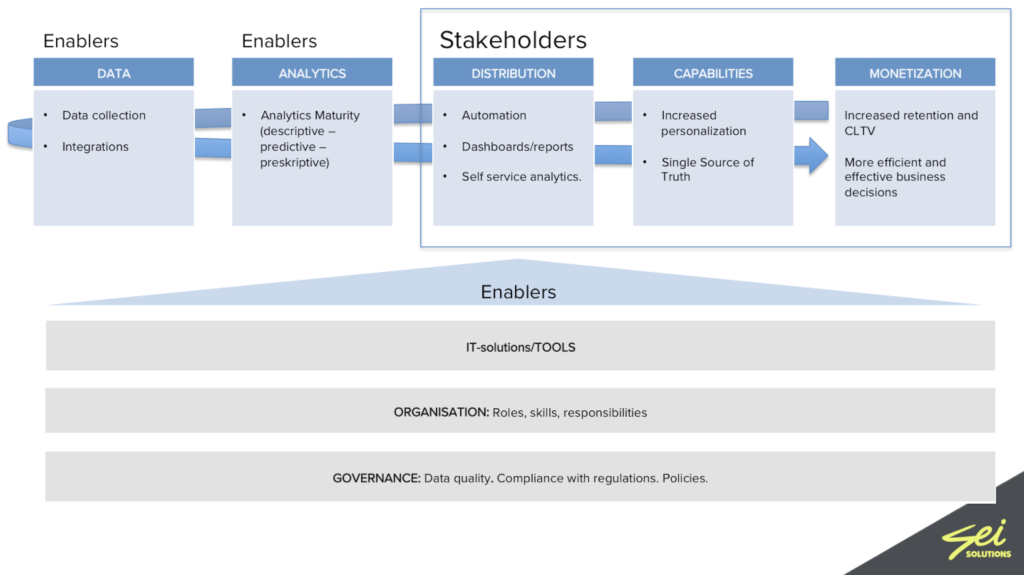The starting point of any Data Strategy is a clear definition of goals; what should be achieved by using data more effectively. It means starting from the top right in the picture below and then you work your way backwards: How do we need information and insights to be distributed, what analytics to apply on the data and what data is needed for this purpose.
It is the end users of the information, the decision makers, who have the primary responsibility for understanding and defining how business can be improved; how marketing, sales, logistics, product development etc. can become more efficient and effective using data. They are the ones whose performances are measured by the different KPI’s that should be improved, i.e. the goals.
Therefore these end users, many times referred to as ”the business”, are the primary stakeholders of any Data Strategy. The primary considerations taken into account should be: What information is needed by what person at what time and in what format and system.
IT-systems and platforms, just like data and the analytics applied on the data, are solely enablers. Absolutely crusial for the end result, but still … just enablers. This is why no Data Scientists will ever come in and revolutionize your business all by themselves; analytics doesn’t add any value if performed in a vacuum. And this is why any smart IT-solution will be wasted money if it doesn’t help providing the right persons, with what they need, when they need it and in the way that they needs it, in order to perform better at work.
Current vendors, how easy it is to administrate different systems, internal IT-policies, cost of scale or current programming skills are all secondary considerations in building a data driven company. At the same time these are the considerations and priorities you will usually get when a project is headed by IT. Also, IT departments are rarely the end users of the information/insights, distributed on the platforms they develop, purchase or support.
So IT, just like your analytics-, HR or Compliance department, are support functions in enabling a data driven way of working, and it makes more sense having the CMO responsible for your company’s Data Strategy than your CIO/CTO. But this is still not an optimal solution. The most obvious challenge is competence and focus; what makes you a great CMO, Director of Sales etc. doesn’t make you a great Data Strategist, and if your job is to boost sales, well then you should focus on selling.
But there is another important thing: Becoming truly data driven requires tearing down your data silos, and the reason these silos exist in the first place is because of technological and organisational boundaries within the company. Every C-level executive works within their own organisational silo, and any Data Strategy developed by the manager of such silo, will be biased towards that part of the business. From a company perspective this will inevitably lead to a suboptimal use of data.
The missing piece is the CDO, who takes an holistic view on the company and the company’s data. Based on a good understanding of all parts outlined in the picture above, the CDO acts as a bridge between ”the business” and IT. The CDO is responsible for making all these parts come together, and is a qualified speaking partner to both IT and ”the business”, always focusing on the business goals, and the end users ability to use the tools and insights they are provided. The C-level status gives the necessary authority when working cross functionally in the company, and when strong internal interests of status quo or suboptimal solutions needs to be challenged.
Just like the other CDO (Chief Digital Officer), the Chief Data Officer is likely to be a temporary role in companies. It’s needed in a time of transformation, but when this transformation is done, the effective use of data should be an integrated part of how the company do business. In the long run the separation of data or digital into their own areas of responsibility, will only add new organisational silos in times where working cross functionally is increasingly important. And as the Chief Data Officers are phased out, the time might have come for the CIO’s to actually mantle the role that their title suggest they already have.

2 comments on “Why you need a CDO (Chief Data Officer)”
Spot on Andreas!
Thanks Anders!